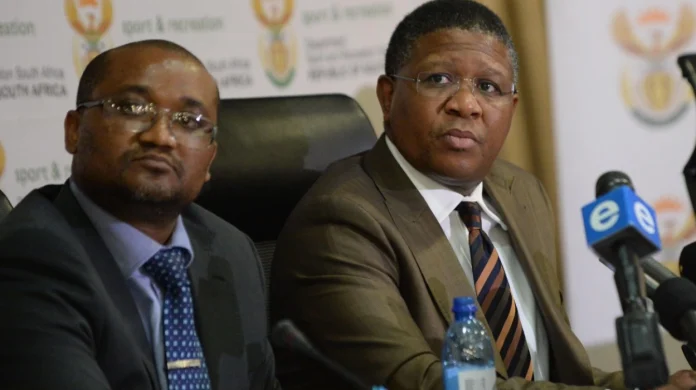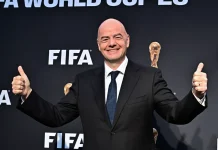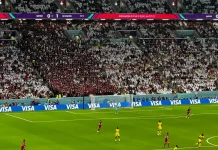After this African qualifiers of the 2026 FIFA World Cup, South Africa got its share of the limelight when it used an ineligible player in a crucial game against Group C. A FIFA disciplinary rule would have resulted in an automatic suspension to the midfielder, Teboho Mokoena, who had already earned two yellow cards in previous games. Instead, he featured in the March 2025 game with Lesotho and helped to create a 2-0 victory (which earned South Africa three points).
After the game South Africa acknowledged an administrative mistake, but the South African Football Association (SAFA) has continued to argue that since Lesotho had not presented a formal protest within the 24 hour official timeframe, the scores should remain the same. A number of federations in Group C have, however, called on FIFA to respond formally, to pressure it to deduct points as a result of the infraction, including Nigeria, Rwanda, Benin and Lesotho.
Five months after the incident, FIFA has not made a public declaration, a fact that has angered stakeholders and has cast uncertainty on the fairness and objectivity of the qualification process. That FIFA still has a few fixtures to be played through before the group stage is completed means that the time and manner in which FIFA ultimately makes a decision will have a major effect on the final standings.
Regulatory frameworks and disciplinary precedents
According to FIFA disciplinary rules, the player who is warned twice during a competition is to go through a one-match ban. The rules also include that playing an ineligible player usually means a forfeit is charged against the violating team as a 3-0 defeat. These regulations are meant to promote fairness and the values of competition in major qualifying competitions.
The case of South Africa is compared to the qualification campaign of Nigeria in 2018, where the team lost three points due to having a suspended player on the field. FIFA was implementing the rule in full force at the time, showing the results of such omissions. Notably, Nigeria’s former coach Gernot Rohr now managing Benin has a vested interest in the current situation, with Benin among the Group C teams affected by the ongoing delay.
FIFA’s current lack of a ruling on South Africa departs from past disciplinary practices. Member associations are now left uncertain about enforcement reliability, weakening trust in FIFA’s governance model. If South Africa were to be docked points in line with precedent, the group’s dynamics would shift dramatically, opening qualification opportunities for other contenders.
Standings volatility and team strategies
South Africa currently leads Group C with 13 points, while Nigeria trails six points behind. A three-point deduction would alter the table significantly, placing pressure on South Africa’s remaining fixtures and boosting Nigeria’s chances to close the gap. Teams are now caught in a strategic dilemma: planning for critical matches amid unresolved standings and unclear eligibility status.
Coaches and technical teams face difficulty preparing lineups, assessing risk, and motivating players without knowing whether current point tallies will hold. The lack of closure has introduced an artificial level of unpredictability into the competition, with ramifications for training, logistics, and mental preparation.
Stakeholder perspectives on fairness and procedure
South Africa’s head coach Hugo Broos has acknowledged the incident as a clerical mistake but emphasized that no formal protest was filed by Lesotho at the time. This procedural argument has been central to SAFA’s defense, though other group rivals dispute the claim that the absence of an immediate protest should override clear-cut rule violations.
The officials of Lesotho and their counterparts in Rwanda and Benin argue that FIFA has the duty of maintaining the disciplinary system irrespective of the filing time of a team, whether it is inside or outside 24 hours. They state that the main problem is not paper work but the need to be treated equally and treat all matches uniformly in the qualification cycle.
Nigerian football officials have grown loud even to the extent of insinuating that any inaction or leniency would be akin to selective application and would be a bad example to follow. In the case of Nigeria, which still has a chance of reaching the summit, the verdict by FIFA could either make or break its qualification journey.
The role of public commentators and fans
The case itself has elicited a massive response among analysts and fans throughout Africa. People are questioning the effectiveness of the qualification process as there are rumors that this process is being slowed down by favoritism or political reasons. The extended period of silence has given detractors an opportunity to cast doubt on FIFA’s neutrality and the fairness of the qualifying process.
Veteran football journalist Oluwashina also took part in the matter and emphasized the harm that a further inaction would do to the credibility that the football community has placed in FIFA and its disciplinary mechanisms. Oluwashina called on FIFA to provide a prompt and clear decision in a social media post, in which he said that silence was merely fuelling speculation and could, therefore, cast doubt on the legitimacy of the eventual Group C outcome.
“We did something bad, but there was no complaint and the rule says if there’s no complaint, there’s nothing.”
South Africa coach Hugo Broos on a possible FIFA sanction for using an ineligible player in 2016 World Cup qualifier vs Lesotho.🎥@Diskifans pic.twitter.com/laR2fxVEEh
— Olúwashínà Okeleji (@oluwashina) August 30, 2025
His remarks mirror a rising chorus of voices in the African game demanding transparency, responsibility and justice in the practice of global governance.
Implications for FIFA’s governance and global credibility
The way FIFA reacts to the South Africa scandal casts serious doubts on the governing structure of the sport organization. Considering a period when the body has been fostering reforms to embrace transparency and institutional accountability, the postponement of a seemingly simple disciplinary issue, seems to be inconsistent with the principles articulated.
International sports organizations also need enforcement of rules as a form of dispute resolution, as well as to stay legitimate. Rules that are not enforced uniformly and also when they are enforced selectively, run the risk of undermining the trust of both stakeholders and fans. The South African case has become the experiment of FIFA adherence to procedural integrity and non-distinction.
African football and broader regional perceptions
This scandal has ripple effects beyond Group C and is felt in other parts of the continent. African federations of football have long complained about being underrepresented and marginalized in FIFA decision-making processes. To some, the fact that it has taken so long to deal with this problem, strengthens the belief that the African qualifier is not always accorded the urgency or seriousness with which it is done when dealing with European or South American situations.
This attitude leads to larger arguments about how FIFA serves to make the world represented and how FIFA serves to make the game played the same way across the board. This constant uncertainty also impacts on sponsorship, media coverage, and fan engagement which play vital roles in the development of football in Africa.
A defining moment for competition integrity
With the final months of the group phase of the African qualifiers of the 2026 FIFA world cup underway, the South Africa points scandal has become the new scandal. The action or inaction will affect not only the positions but also the reputational capital of the participating institutions.
The need to solve becomes even more urgent as the final playing days and final playoffs arrangements run out. It is not just a quarrel over three points and is an affirmation of the hardships of international governance, the importance of honesty and of the uneasy trust on which international sport is based.
Whether FIFA can in the coming weeks reestablish its position as a bulwark of fairness or whether further silence will only lead to more questioning of its procedures especially on those who feel unfairly victimized in the most momentous games is yet to be seen.













